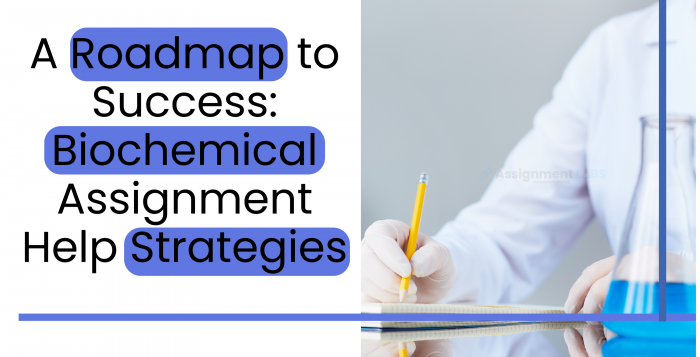A Roadmap to Success Biochemical Assignment Help Strategies
In the world of academia, the road to success often leads through the intricacies of biochemical assignments. These assignments demand a thorough understanding of complex concepts, practical applications, and precise articulation. Navigating this terrain requires not only knowledge but also effective strategy. If you are looking to write a expert biochemical assignment writing UK, here is a comprehensive roadmap to conquer these academic challenges.
Table of Contents
| Sr | Headings |
|---|---|
| 1. | Understanding the Assignment Requirements |
| 2. | Research Techniques for Biochemical Topics |
| 3. | Organizing Your Approach |
| 4. | Crafting a Clear Structure |
| 5. | Writing with Precision and Clarity |
| 6. | Review and Revision Strategies |
| 7. | Leveraging Credible Sources |
| 8. | Seeking Guidance and Assistance |
| 9. | Overcoming Challenges: Tips and Tricks |
| 10. | Embracing Time Management |
| 11. | Balancing Theory with Practical Application |
| 12. | The Art of Referencing |
| 13. | Ensuring Originality: Avoiding Plagiarism |
| 14. | Stress Management in Academic Pursuits |
| 15. | Conclusion: Your Path to Biochemical Success |
Understanding assignment requirements
Before diving in, decode the basic requirements of the assignment. Highlight key elements, such as scope, formatting guidelines, and specific areas of focus.
Research Techniques for Biochemical Topics
Master the art of research. Explore authoritative databases, journals, and scholarly articles to gather a comprehensive understanding of the topic.
Organizing your approach
Develop a structured plan of action. Outline the assignment, create a roadmap that guides you through each step of the process.
Develop a clear structure
Build a strong framework. Ensure a logical flow of ideas, combining the introduction, body, and conclusion in a coherent manner.
Write with accuracy and clarity
Communicate effectively. Use simple but precise language to explain complex biochemical concepts.
Revision and revision strategies
Refinement is key. Allocate time for thorough reviews and revisions to increase the quality of your work.
Leverage reliable sources
Quality over quantity. Prefer reliable sources to increase the authenticity and reliability of your assignment.
Seeking guidance and support
Don’t hesitate to ask for help. Consult professors, peers, or educational resources for guidance and clarification.
Overcoming Challenges: Tips and Tricks
Face the challenges head on. Develop strategies to effectively tackle complex topics or difficult sections.
Embrace time management
Manage your time wisely. Create a schedule that allows for efficient allocation of time for research, writing, and editing.
Equilibrium theory with practical application
Fuse theory with real-world applications. Demonstrate a deeper understanding by combining theoretical concepts with practical examples.
The art of referencing
Master the art of referencing. Follow a specific style of referencing and maintain consistency throughout your assignment.
Ensuring Originality: Avoiding Plagiarism
Maintain academic integrity. Cite sources accurately and employ plagiarism checkers to ensure originality.
Stress management in academic activities
Prioritize mental health. Implement strategies to manage stress and maintain a healthy balance between academics and personal life.
Conclusion: Your Path to Biochemical Success
Biochemistry assignments can be daunting to tackle, but armed with these strategies, you’re equipped to navigate the challenges. Success lies not only in knowledge but in the application of effective methods.
Frequently Asked Questions
1. How do I start a Biochemistry assignment?
To begin with, understand the requirements of the assignment well and create a structured plan.
2. Where can I find reliable sources for my research?
Explore biochemistry academic databases, journals and reputable websites.
3. How can I balance theory and practical applications in my assignments?
Explain theoretical concepts with real-life examples or case studies to demonstrate practical applications.
4. What should I do if I encounter writer’s block while writing an assignment?
Take a break, revise your plan, and get inspiration from different sources before returning to writing.
5. How can I make sure my assignment is plagiarism-free?
Use plagiarism checkers and properly cite all sources to maintain originality.
Starting the journey of biochemical assignments requires not only academic ability but also effective strategies. With the right roadmap and tools at your disposal, conquering these educational pursuits becomes an achievable feat.



